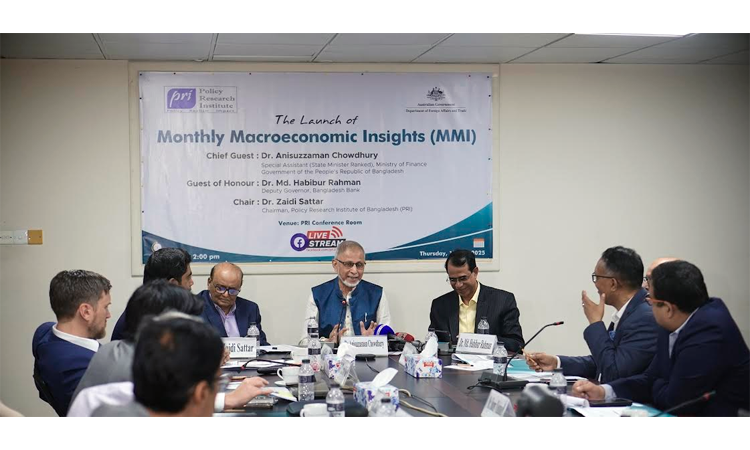News Flash
News Flash

DHAKA, May 15, 2025 (BSS) - The Policy Research Institute of Bangladesh (PRI) today launched its inaugural edition of the Monthly Macroeconomic Insights (MMI) through a keynote presentation and high-level policy discussion.
The MMI is a new initiative developed by PRI's Center for Macroeconomic Analysis (CMEA) with support from the Australian Department of Foreign Affairs and Trade (DFAT).
The event was chaired by Dr Zaidi Sattar, Chairman of PRI, and graced by Dr. Anisuzzaman Chowdhury, Chief Adviser's Special Assistant for the Ministry for Finance as chief guest.
Dr. Md. Habibur Rahman, Deputy Governor of Bangladesh Bank, joined as the guest of honour.
Clinton Pobke, Deputy Head of Mission, and Joshua Gacutan, Second Secretary, from the Australian High Commission in Bangladesh, participated as Special Guests.
The keynote presentation was delivered by Dr. Zaidi Sattar and Dr. Ashikur Rahman, Principal Economist at PRI.
In his speech, Anisuzzaman Chowdhury stated, "Global economic history shows that nations achieve sustained development when policy coherence is paired with strong social capital. Bangladesh must prioritize both. The government is committed to aligning its policies around clear objectives. While challenges are inevitable, LDC graduation offers a valuable opportunity to reassess our trajectory, learn from past missteps, and move forward with renewed strategic clarity and resolve."
Dr. Md. Habibur Rahman said, "Exchange rate liberalization will benefit Bangladesh on multiple fronts. Notably, the exchange rate has remained stable even after the move to a floating regime. Considering the current reserve levels, improvements in the current account, and overall balance of payments, we are well-positioned to manage any potential exchange rate overshooting. I remain optimistic about the trajectory of economic recovery."
Clinton Pobke commended the initiative, saying: "We are proud to support efforts that enhance evidence-based policy dialogue and contribute to more effective, timely policymaking. I commend PRI for bringing together macroeconomic data, rigorous analysis, and impactful presentation in a way that can meaningfully inform and influence policy decisions."
Upon reviewing the economic growth scenario, Dr. Zaidi Sattar pointed out that in the current year, macroeconomic stability has been restored, and the economy is poised to return to a higher growth trajectory. Our export potential is hobbled by a highly protective tariff regime that creates a persistent anti-export bias in policy incentives.
Dr. Ashikur Rahman added, "While external balances are improving, persistent fiscal weaknesses are making the ongoing economic recovery very fragile. However, the dissolution of the NBR and creation of separate Revenue Policy Division and Revenue Management Division is a step forward, alongside the new bank resolution ordinance that strengthens BB's authority to manage the weakened financial sector."
The March edition of the MMI highlighted key developments, including a modest rebound in GDP growth in Q2 FY25, persistent inflationary pressures, and progress in the external sector driven by robust export performance and strong remittance inflows. However, it also underscored persistent revenue collection challenges and limited fiscal headroom for counter-cyclical spending.